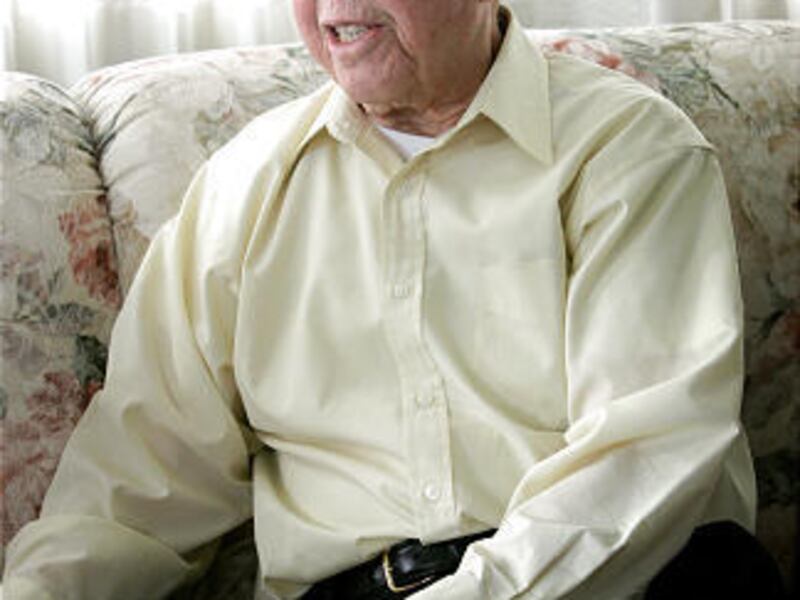His age would fool you because Russell Clark was eternally young at heart, right up to his death this past Thursday at 108.
The reigning "oldest Utahn" had lived through flu epidemics, built a medical profession and got out of debt during the Great Depression, and helped build homes even at the ripe old age of 100.
Family and friends described Clark as positive man who worked hard his entire life, as a physician, real estate manager and father of five children.
Age was just a number, not a determiner of energy or vitality. Clark never let it slow him down.
At 97, he traveled to Jordan and Israel with his youngest son, Robert, on a humanitarian trip. At 98, he ran the Corpus Christi relay marathon — four miles per runner. At 104, he was still on the road driving through St. George, where he moved in 1990 to retire.
And his vitality began at an early age.
In the early 1900s, Russell Clark grew up on a farm in Georgetown, Idaho, where he milked cows, helped his mother make and sell ice cream and did countless other chores.
"He knew from an early age he wanted to become a doctor," said John Clark, Russell Clark's eldest son, who followed in his father's footsteps as a doctor. "The doctor who had attended some of his family members was very influential. By age 12 he knew."
The doctor-to-be spent two years as a missionary for The Church of Jesus Christ of Latter-day Saints in Florida and Georgia before starting medical school at the University of Utah, where he met his first wife, Ruby Clark, who later died of a heart condition. The medical school was only two years at the time, so Russell Clark moved to Chicago to finish his degree at Northwestern University.
Clark was an intern at the Cook County Hospital when victims from the St. Valentine's Day Massacre were rushed in. Clark was required to determine if they were dead.
"He was at the receiving end of the emergency room when Al Capone's victims came in. He was a medical student serving an assigned shift in the emergency department," said John Clark, 76. "He lived through the era of prohibition, gangsters."
That did not at all influence Russell Clark's personality: His children mostly remember him for the positive attitude and generous spirit and his habit of helping others.
Eldest daughter Beverly Johnson, 78, remembers helping her father at his medical office and how if a patient couldn't pay for medicine or pills, her father would find a way for them to afford it — even if it meant providing the patient the medicine for free.
Even after retiring, Russell Clark spent time helping at the LDS Church Welfare farm, and he served a mission with his second wife, Donna Clark, who died just five weeks ago.
Clark retired late from medicine. He was still taking patients when he turned 75. To fill the time after ending his practice, Clark helped build several homes and went into real estate development, work that helped lead to him receiving the title of the oldest worker in the nation in 2003.
Swinging a hammer, Clark could be found helping workers erect several homes at an age that left many reliant on a wheelchair or other people to get around.
"He wouldn't walk with a cane or a wheelchair," John Clark said. "He said it made him look like an old man. He would only walk with a staff as long as someone walked with him."
People often asked what Russell Clark did to maintain such a long, healthy life. Clark's explanation was that he drank two quarts of fruit juice and water each day and exercised constantly.
Up until a year ago, at 107 years old, Russell was able to walk a mile each day, said Robert Clark, 56, Russell Clark's youngest son.
"He did try to take good care of himself," said Robert Clark, who also became a physician. "By eating healthy, and his religious beliefs and a positive outlook all contributed to his health."
Russell Clark also came from a family with exceptional longevity. He leaves behind one sister, LeOra Larsen, who is 102 years old. His father, Wilford Clark, lived to be 96 years old and two uncles broached the 100-year mark.
Right up to his death, Russell Clark left his mark, whether it was on his 108 descendents, his former patients, his friends or anyone who met him.
"He had an extraordinary cheerful outlook on life," Robert Clark said. "He enjoyed being with people. And he was in the lives of a lot of people, helping till very late in his life."
e-mail: lgroves@desnews.com

